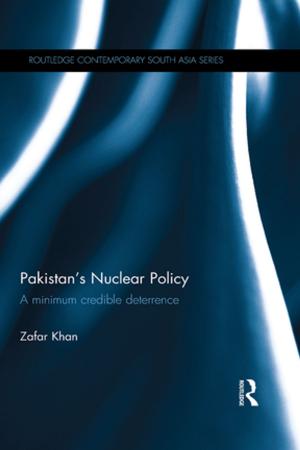Challenging Authoritarianism in Mexico
Revolutionary Struggles and the Dirty War, 1964-1982
Nonfiction, History, Americas, Mexico, Social & Cultural Studies, Political Science, Politics, Civil Rights| Author: | ISBN: | 9781136478505 | |
| Publisher: | Taylor and Francis | Publication: | April 23, 2012 |
| Imprint: | Routledge | Language: | English |
| Author: | |
| ISBN: | 9781136478505 |
| Publisher: | Taylor and Francis |
| Publication: | April 23, 2012 |
| Imprint: | Routledge |
| Language: | English |
The Cold War in Latin America spawned numerous authoritarian and military regimes in response to the ostensible threat of communism in the Western Hemisphere, and with that, a rigid national security doctrine was exported to Latin America by the United States. Between 1964 and 1985, Argentina, Chile, Mexico, Brazil, Paraguay, and Uraguay experienced a period of state-sponsored terrorism commonly referred to as the "dirty wars." Thousands of leftists, students, intellectuals, workers, peasants, labor leaders, and innocent civilians were harassed, arrested, tortured, raped, murdered, or 'disappeared.'
Many studies have been done about this phenomenon in the other areas of Latin America, but strangely, Mexico's dirty war has been excluded from this particular scholarship. Here for the first time is a sustained look at this period and consideration of the many facets that make up the nearly two decades of the Mexican dirty war. Offering the reader a broad perspective of the period, the case studies in the book present narratives of particular armed revolutionary movements as well as thematic essays on gender, human rights, culture, student radicalism, the Cold War, and the international impact of this state-sponsored terrorism.
The Cold War in Latin America spawned numerous authoritarian and military regimes in response to the ostensible threat of communism in the Western Hemisphere, and with that, a rigid national security doctrine was exported to Latin America by the United States. Between 1964 and 1985, Argentina, Chile, Mexico, Brazil, Paraguay, and Uraguay experienced a period of state-sponsored terrorism commonly referred to as the "dirty wars." Thousands of leftists, students, intellectuals, workers, peasants, labor leaders, and innocent civilians were harassed, arrested, tortured, raped, murdered, or 'disappeared.'
Many studies have been done about this phenomenon in the other areas of Latin America, but strangely, Mexico's dirty war has been excluded from this particular scholarship. Here for the first time is a sustained look at this period and consideration of the many facets that make up the nearly two decades of the Mexican dirty war. Offering the reader a broad perspective of the period, the case studies in the book present narratives of particular armed revolutionary movements as well as thematic essays on gender, human rights, culture, student radicalism, the Cold War, and the international impact of this state-sponsored terrorism.















